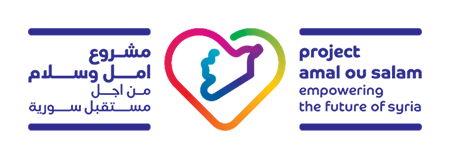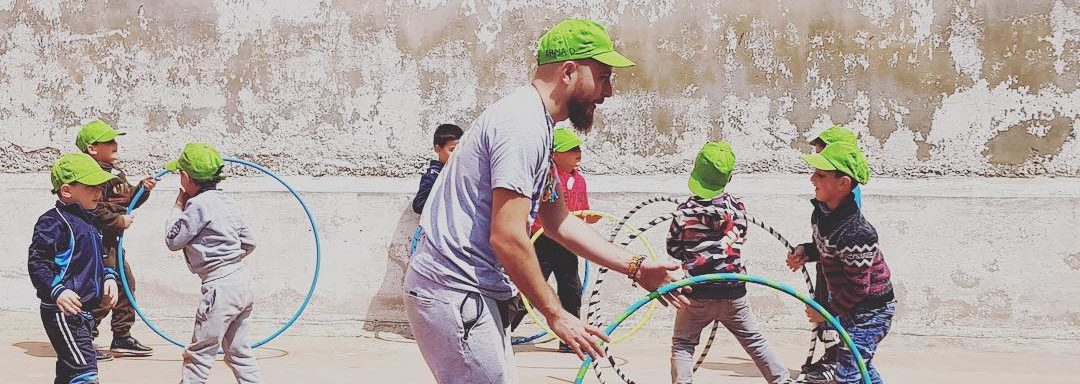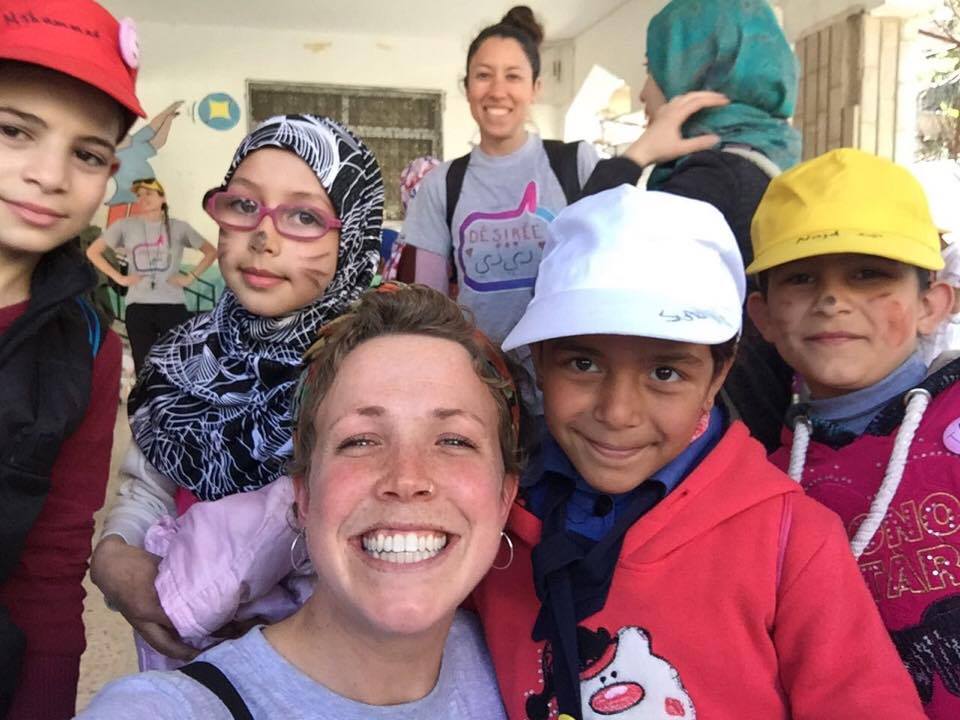Guest post by volunteer Alice Peck
I’m sitting on a leafy balcony in the Rmeil area of Beirut, Lebanon. It is dusk and, apart from my flight here last night, this is the first time I have had alone since I landed in Amman just over one week ago – a time period that seems too short to contain all of the experiences, encounters, interactions, emotions that have just passed. There is a lot to say about Project Amal ou Salam, the resilience and hope of the Syrian children I met, the inspiring volunteers with whom I feel so honoured to have worked alongside, the work we did …
I’m thinking about the final day of the workshops. It’s Wednesday, and we arrive mostly on time to a school in Irbid, northern Jordan, comprised of Syrian, Palestinian, and even Iraqi children who are refugees in the country. I’m a team leader with the Yellow Team along with two other volunteers, one of whom is an Arabic-speaker. Our role is to guide and support a group of 30 or so children, aged 7-8, through the day’s schedule of breakfast, Photography, Sports, Health, lunch, Art, Music, and the farewell assembly to conclude the day. Amal ou Salam workshops begin similarly at each school; Sousou, the ever energetic volunteer, clowns around entertaining while we assemble the children by age group on the playground, give out brightly coloured hats to assign teams, and gather each group around packed breakfast bags – made by volunteer Bashar and containing zaatar and cheese manoush, an apple and milk. Today is no different and yet, as we hand out breakfast, a little boy, Mohammed, tugs at my hand and mumbles something. Speaking frustratingly little Arabic, I take Mohammed’s hand and we walk over to Aya, another yellow team leader, who listens to Mohammed and translates that he doesn’t want breakfast, that his stomach hurts. A teacher joins us and explains that each day Mohammed experiences these digestive problems, complains of a stomach-ache and refuses to eat. The teacher implied that the trauma of leaving Syria as well as ongoing conflict at home have become physically manifested in Mohammed’s digestion system.
Mohammed’s complaints do not abate and, in the first workshop session of photography, his discomfort is clear as he bends forward, clutching his stomach. Despite our gentle encouragement, he does not participate in taking photographs, nor in face painting and, as we lead the children out for sports, he sits at the side, watching. I walk over to him and he takes my outstretched hand, walking with me to join the group, who are holding hands in a large circle on the playground. I look down at Mohammed and smile. He smiles back, giggles, before quickly dropping my hand and running off, laughing. I chase him, running around other kids, before I catch him and sweep him up into my arms, the two of us laughing. We join the large circle again and this time Mohammed stays put, holding my hand, smiling up at me. Throughout Sports Mohammed is engaged and involved – dancing alongside the others to music, impersonating an elephant’s lolloping trunk, roaring like a tiger, pulling hard at the tug-o-rope. His energy and participation continues throughout the day; in Art, he makes a beautiful and impressive roof in the “rebuild your town” activity, he loudly sings the Amal ou Salam song in Music and, at lunch, he eats his entire sandwich! Every time I glance over to check on Mohammed, my smile is returned by the biggest of his.
To see the transformation in Mohammed from the reluctant, pained, distant child of the morning to the smiling, energised, happy boy who fully participated in activities and meals was a powerful moment for me. It was a moment of appreciation for the work that Project Amal ou Salam does, and a visible realisation of the critical importance and value of play and love in response to the trauma of war, violence, and displacement – trauma which no child should ever be forced to encounter.
The day of workshops concludes – the children gather for a final rendition of our songs, the giving out of backpacks full of presents, and a farewell. Countless hugs are exchanged and after heartfelt goodbyes, the volunteers pile onto the bus for the 2+ hour ride back to Amman. In between singing and dancing on the “party bus,” I think about Mohammed and reflect on trauma and the multiple physical and emotional ways in which it can be experienced. I can’t begin to imagine what Mohammed has witnessed in fleeing Syria, and I don’t know how this might affect his life in the long term. Today, however, I both observed and felt a part of the tangible impact that Project Amal ou Salam has. Despite considerable volunteering in the past, as well as working in social justice, this feeling is new.
Reflecting on my week with PAouS in Jordan, it feels remarkable to assert, quite confidently, that the work we did makes a difference – a clichéd phrase that, of course, is subjective, varied, and difficult to measure. Yet the energy and passion that stems from the volunteers – who travelled from every corner of the world to be there: from Syria, Lebanon, Jordan, Dubai, Egypt, Switzerland, USA, UK, Italy, Belgium, Bangladesh, and Canada – is a force of love and playfulness that fills every minute of each day’s workshops. We spend each day playing with the children of Syria – hopeful, resilient, energetic, beautiful children – giving all our energy, attention, hope, and empathy to make each child feel loved and empowered to envision a future of hope and peace for themselves and for Syria.
The connection I feel to Amal ou Salam – the children, the vision, the volunteers – is profound and guarantees that I will return.







